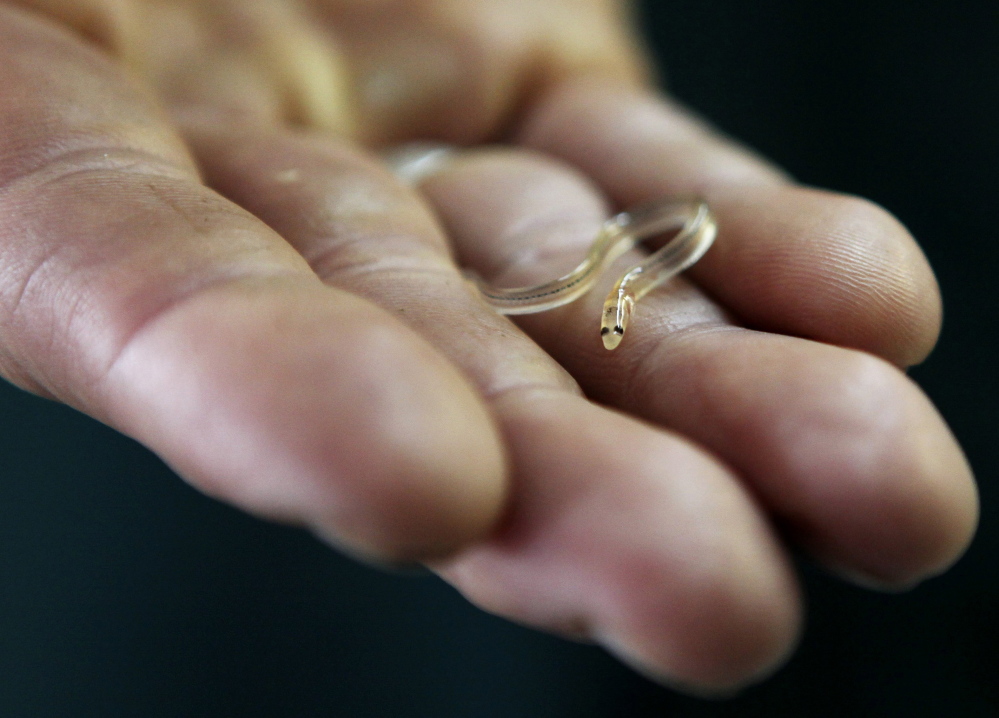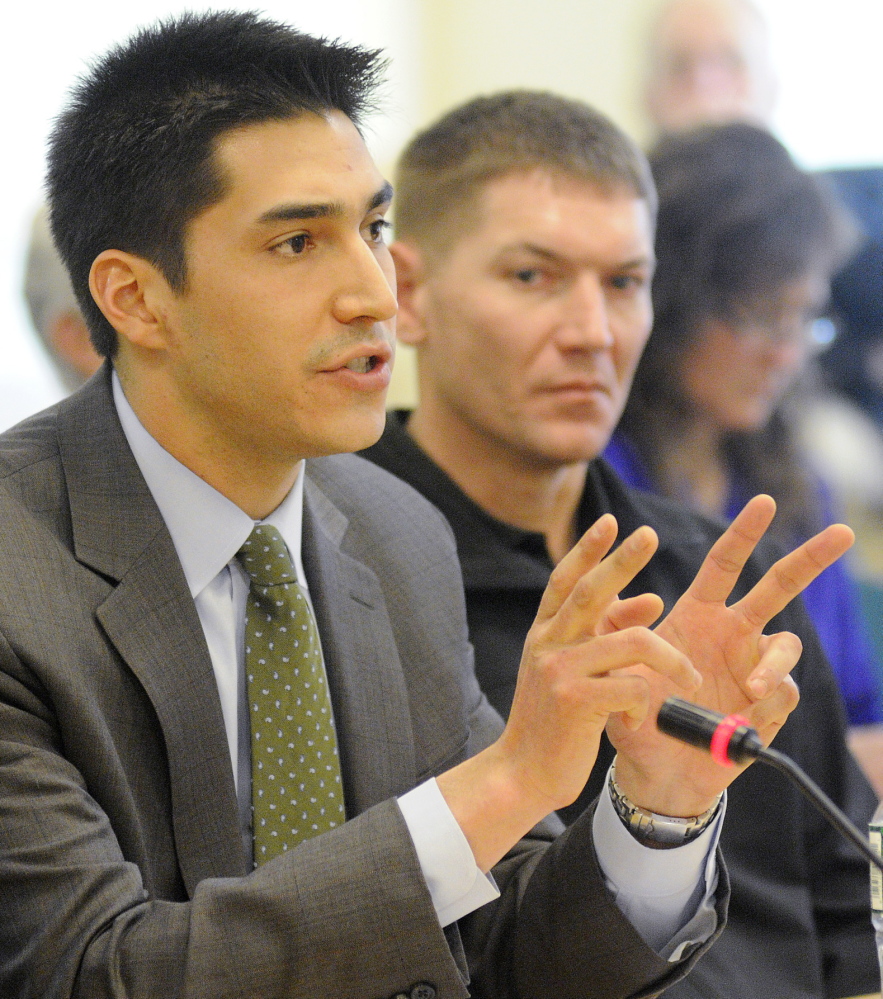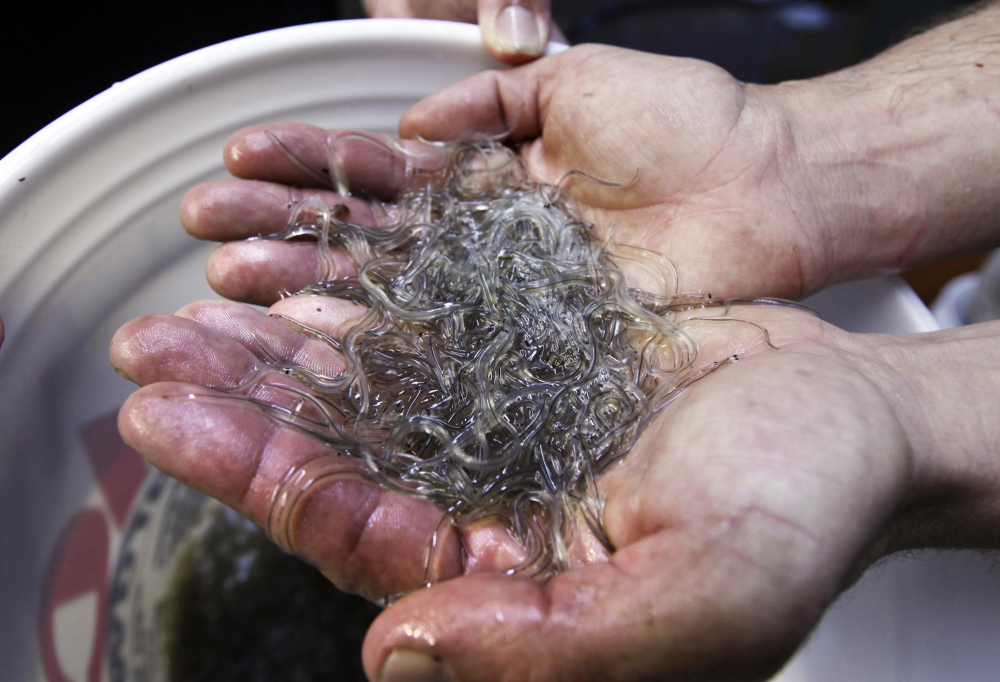AUGUSTA — The state and Maine’s Indian tribes are approaching a deal that would effectively allocate part of the lucrative elver fishery to the tribes, defusing tension that arose last year but creating separate regulations for tribal and non-tribal fishermen.
Significant sticking points that remain have hindered efforts by the LePage administration and lawmakers to steer the $40 million industry away from the brink of closure by federal authorities.
State officials are trying to balance conservation of the fishery with the sovereignty of the tribes, including the Passamaquoddies. The tribe issued 575 licenses last year, well above the state limit of 200, and that led to a clash between law enforcement officers and Passamaquoddy fishermen on the banks of the Pennamaquan River in Washington County.
A bill backed by the LePage administration and sponsored by Rep. Walter Kumiega, D-Deer Isle, would invalidate elver licenses issued by any tribe without ratification by the state, set catch limits for individual fishermen, and impose criminal penalties for all elver fishermen who violate state regulations.
Lawmakers’ consideration of the bill was complicated Wednesday as tribal representatives and members of the LePage administration met with the state Attorney General’s Office to discuss a deal that would exempt tribal fishermen from the catch quotas and the criminal penalties, while keeping the current regulations for all other elver fishermen.
The agreement also would allow tribal members to catch as many elvers, collectively, in the season that begins March 22 as they did in 2013.
In exchange, the tribes’ fishermen would participate in a new state-issued swipe card system designed to track the catch daily while assigning it to individual harvesters and dealers. Also, tribal fishermen would use only dip nets, not the fyke nets that typically ensnare more of the baby eels.
The Attorney General’s Office has constitutional concerns about the agreement, said Marine Resources Commissioner Patrick Keliher. The AG’s Office believes the agreement and Kumiega’s bill, L.D. 1625, could create unequal treatment of elver fishermen, Keliher said.
Such concerns ignore the tribes’ sovereignty, said Michael-Corey Hinton, a native Passamaquoddy and a Washington, D.C., lawyer who is working pro bono for the Joint Tribal Council of the Passamaquoddy Tribe.
“Over the course of history in this state, we have been subjected to unequal treatment at nearly every single turn,” Hinton told lawmakers on the Marine Resources Committee. “The legal system as it is dictated to us is fraught with inequity. As we approach these negotiations, as a federally recognized sovereign government with citizens who occupy a separate political class in the United States … we recognize that we can’t simply have our own plan and do what we want. We need to work together.”
Hinton said the dip net restriction, swipe card compliance and a 1,650-pound catch limit outlined in the agreement are significant concessions that exceed the state’s conservation measures.
“We have bent over backwards,” he said. “We want this deal so terribly badly because this is what we need to allow our tribal members to exercise their rights to survive.”
Hinton and Keliher said the two sides are close to an agreement, but haven’t settled on a penalty provision if the tribes exceed their quota or continue to fish for elvers after the state shuts down the fishery.
Hinton expressed confidence that an agreement can be reached. Keliher was more cautious.
“We are yet so close but still so far away,” said Keliher, and any deal would have to clear constitutional hurdles and win approval from federal regulators with the Atlantic States Marine Fisheries Commission. He said federal authorities nearly shut down the fishery last year after the conflict between law enforcement and the Passamaquoddies.
STATE PRESSURED TO CLOSE ELVER FISHERY
The only reason there will be a 2014 season, he said, is because the state agreed to a 35 percent reduction in landings from last year, to about 11,750 pounds statewide.
“We’re under a tremendous amount of pressure to close the fishery,” Keliher said. “If we can’t show solid progress, I believe we’re jeopardizing the entire fishery for both tribal and non-tribal fishermen.”
The state is trying to regulate an industry that has been primarily a cash business. The pressure to increase regulations and monitor the catch follows a spike in market prices in 2011 that led to poaching and illegal sales of eels from other states.
Maine and South Carolina are the only states with commercial elver fishing. Elver prices soared after a tsunami in Japan in 2011 wiped out eel farms. Prices, which were as low as $25 a pound, climbed above $2,000 a pound in 2012.
That year’s haul of about 19,000 pounds was worth nearly $40 million, making elvers Maine’s second-most valuable fishery, after lobster. Some fishermen earned more than $100,000 during the 76-day season.
Landings declined slightly in 2013, to a total of 18,253 pounds with a value of nearly $33 million.
Last year, when the Passamaquoddy Tribe issued more licenses than the state allowed it, marine officers issued court summonses to its fishermen. However, several district attorneys found that they couldn’t prosecute because tribal members had assumed their licenses were valid because they were certified by the tribe.
Keliher said Kumiega’s bill would ensure that future prosecutions could proceed by making the state the primary licensing authority. Rather than receiving licenses from their tribes, Indian fishermen would get their licenses directly from the state.
The tribal-state commission opposed the measure, saying it would undermine tribal fishing rights and strain tribal-state relations. In a letter to the Marine Resources Committee, commission Chairwoman Jamie Bissonette Lewey called it “unacceptable.”
CATCH QUOTA FOR NON-TRIBAL HARVESTERS
The bill calls for significant changes for non-tribal harvesters, including:
• A 35 percent reduction in the statewide catch quota, from the 18,076 pounds reported in 2013 to 11,749 pounds for the upcoming season.
• A quota would be assigned to each harvester based on a three-year average of the reported catch. Keliher said the individual quota would prevent a “derby” setting that could increase competition and conflicts between fishermen. The three-year average would reward fishermen who have been in the industry longer.
• Harvesters who exceed their quota by more than 5 percent would have their licenses suspended for the next season. They also would pay restitution equal to the value of what they harvested illegally.
• Starting this season, elver fishermen would have to use swipe cards to report their harvest. Licenses would be issued by the state and collected in person by each harvester.
• Harvesters would have to have their swipe cards at all times while fishing.
• Swipe card violations would be a Class D crime, subject to as much as a $2,000 penalty.
Forest Nohr, 33, an elver fishermen who lives in Portland, said Wednesday that the changes are positive because they reward those who fished for elvers before the 2011 boom and those who were honest about their reported landings.
Nohr, who was unaware of the state’s tentative agreement with the tribes when interviewed, said the regulations must be applied equally among all fishermen.
The Marine Resources Committee will continue to review L.D. 1625 on Feb. 6.
This story has been corrected to note that Hinton is representing the Passamaquoddy Tribe.
Steve Mistler can be contacted at 791-6345 or at:
smistler@pressherald.com
Twitter: @stevemistler
Send questions/comments to the editors.






Success. Please wait for the page to reload. If the page does not reload within 5 seconds, please refresh the page.
Enter your email and password to access comments.
Hi, to comment on stories you must . This profile is in addition to your subscription and website login.
Already have a commenting profile? .
Invalid username/password.
Please check your email to confirm and complete your registration.
Only subscribers are eligible to post comments. Please subscribe or login first for digital access. Here’s why.
Use the form below to reset your password. When you've submitted your account email, we will send an email with a reset code.